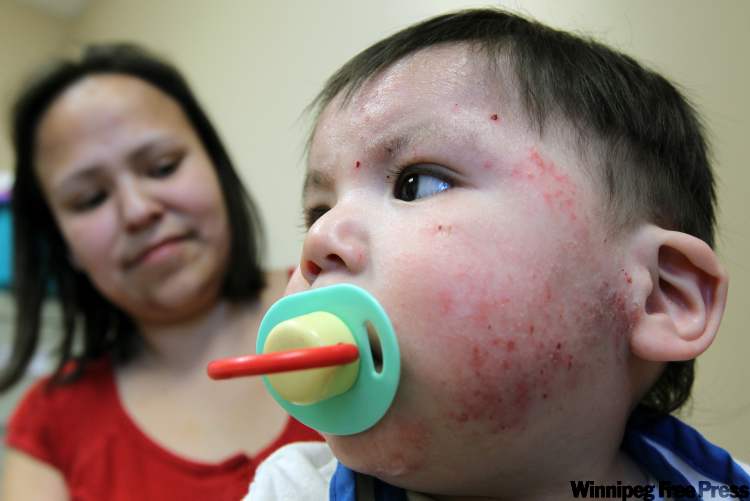Poor sanitation, poor health
Advertisement
Read this article for free:
or
Already have an account? Log in here »
To continue reading, please subscribe:
Monthly Digital Subscription
$0 for the first 4 weeks*
- Enjoy unlimited reading on winnipegfreepress.com
- Read the E-Edition, our digital replica newspaper
- Access News Break, our award-winning app
- Play interactive puzzles
*No charge for 4 weeks then price increases to the regular rate of $19.00 plus GST every four weeks. Offer available to new and qualified returning subscribers only. Cancel any time.
Monthly Digital Subscription
$4.75/week*
- Enjoy unlimited reading on winnipegfreepress.com
- Read the E-Edition, our digital replica newspaper
- Access News Break, our award-winning app
- Play interactive puzzles
*Billed as $19 plus GST every four weeks. Cancel any time.
To continue reading, please subscribe:
Add Free Press access to your Brandon Sun subscription for only an additional
$1 for the first 4 weeks*
*Your next subscription payment will increase by $1.00 and you will be charged $16.99 plus GST for four weeks. After four weeks, your payment will increase to $23.99 plus GST every four weeks.
Read unlimited articles for free today:
or
Already have an account? Log in here »
Hey there, time traveller!
This article was published 30/10/2010 (5522 days ago), so information in it may no longer be current.
ST. THERESA POINT — Baby Jacob’s face is covered in crusting sores that look painful, but he sleeps in his mother’s arms, beautiful moccasins made by his great-grandmother on his dangling feet.
Young mother Valene Flett waits patiently with her adopted son at the nursing station.
Nurses aren’t certain what Jacob’s itchy skin condition is — eczema, perhaps — but they’ve told Flett the best way to help the child’s skin heal.

“Keep him clean all the time,” she said.
Sounds simple, but it’s a tall order in the Flett household, where they have to haul water from one of the town’s outdoor taps.
“I only have one pail,” she said.
One 38-litre pail for five family members works out to about eight litres of clean water per person each day in a community where everything is covered in a thick layer of mud from the unpaved roads. That’s half the amount of water the family would likely be given by international aid agencies if the situation were recognized as a health emergency.
“Lack of sanitation and clean water is causing outbreaks of diarrhea and… children wearing the same muddy clothes for days are developing skin diseases like scabies,” the president of World Vision Canada wrote in September. “Innocent children urgently need Canadians to set aside any hesitation about helping them.”
He was talking about flood-ravaged Pakistan, but he might as well have been looking around the nursing station in one of Island Lake’s four communities.
There’s a danger Jacob’s sores will get infected from bacteria that thrive on rarely washed skin.
Nursing stations in Island Lake offer baths to medically vulnerable people who have no running water at home. “We complain to each other about how much time we spend on that stuff,” said a medical professional.
“We would like to spend more time on education, heart disease, diabetes prevention, maternal-child issues. But we can’t because we’ve got to take care of what needs attention right now.”
Being unable to wash can have much more serious health consequences than diarrhea and skin infections, as residents of St. Theresa Point discovered when H1N1 flu exploded in spring 2009.
“Lack of access to water and overcrowding facilitate the spread of these viruses,” a Health Canada media spokeswoman acknowledged.
Most of the extra work trying to keep families healthy without running water falls to women in the community, who have to find creative ways to wash food, kids, dishes and floors. It’s another barrier to women finding time for paid work in communities where only about a quarter of the adults are employed.
“Our women deserve better,” said Red Sucker Lake health director Fred Harper.
In homes where the men in the family are away working or disabled, hauling water also falls to the women and kids.
Ruth Wood, 64, lugs the latrine pail up a hill to the outhouse to dump it because her husband is in a wheelchair after neck surgery and can’t walk to the privy.
She is getting worn out by the heavy physical work.
“Maybe I’ll fall.”
James Wood worries they’ll be forced out of their home when his wife can no longer handle the buckets. “I’ll just have to get well and be able to walk.”
In winter, Nicole Mason, 14, and her little brother Andy, 6, haul drinking water home in St. Theresa Point on a plastic sled through driving snow.
It’s even harder in summer.
Bernard Flett can barely walk, so one of his daughters sometimes hauls two buckets at a time with a wooden yoke over her shoulders. Flett’s father carved it decades ago, when the family used to pull drinking water from the nearby lake.

